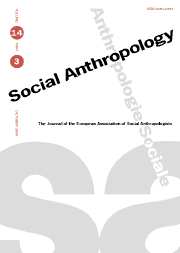Article contents
On anthropological knowledge
Published online by Cambridge University Press: 22 February 2005
Abstract
With the expansion of anthropology to new objects, the definition of its boundaries has become so fuzzy as to warrant questions about its unity. Method rather than content offers possible common ground to various breeds of anthropologist, provided that it is taken to mean what they really do rather than what they say they do. In discussing three operations that enter into their common practice (description, comprehension and explanation), it is argued that anthropology amounts less to a specific method answering to strict epistemological requirements than to a certain style of knowledge building on the universal workings of intersubjectivity.
L'annexion de nouveaux objets par l'anthropologie a rendu ses frontières si indécises que l'on peut se demander ce qui fonde son unité. On doit la chercher moins dans un éventuel contenu que dans sa méthode, à condition d'envisager celle-ci du point de vue de ce que les anthropologues font réellement, non de ce qu'il disent faire. L'examen de trois opérations qu'ils pratiquent communément (la description, la compréhension et l'explication) permet de montrer que l'anthropologie est moins une méthode formellement définissable qu'un style de connaissance très particulier faisant appel aux mécanismes universels de l'intersubjectivité.
Durch die Ausweitung der Anthropologie auf neue Forschungsobjekte haben sich ihre Grenzen so verschoben, dass sich erneut die Frage nach ihren sie vereinheitlichenden Grundlagen stellt. Mehr als der Inhalt bietet sich die Methode als Gemeinsamkeit von in verschiedene Richtungen tendierenden Anthropologen an – vorausgesetzt man vergegenwärtigt sich das, was sie wirklich tun und nicht das, was sie vorgeben zu tun. In der Betrachtung dreier Vorgehensweisen, die der gemeinsamen Praxis angehören (Beschreiben, Verstehen und Erklären), gelangt man zur Behauptung, dass Anthropologie weniger einer spezifischen Methode nach strengen epistemologischen Anforderungen entspricht, als einem bestimmten Wissensstil, der sich auf die universellen Mechanismen von Intersubjektivität stützt.
La adición de nuevos objetos en la antropología ha hecho difícil la definición tanto de los límites de ésta, como la garantía de su unidad. El método, más que el contenido, ha hecho posible un punto de partida común para diferentes tipos de antropólogos; así, se conviene sobre lo que los antropólogos hacen en realidad, y no sobre lo que ellos dicen que hacen. Al examinar las tres operaciones que constituyen su práctica común (describir, comprender y explicar), queda de manifiesto que la antropología contribuye poco a la construcción de un método que dé respuesta a problemas epistemológicos, pero más a cierto estilo de producción de conocimiento sobre los mecanismos universales de la intersubjetividad.
- Type
- Special section: Three lectures on the future of anthropology in Europe
- Information
- Copyright
- © Cambridge University Press 2005
- 23
- Cited by


